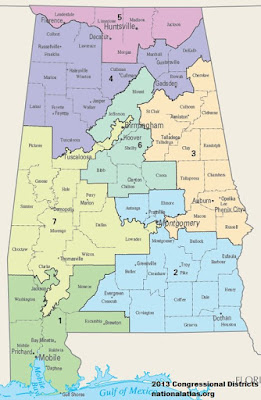Study Vividly Highlights the Connection Between 2020 Census Response and Federal Funding for Alabama’s 7th Congressional District
By Jim Murray | Business, Science and Technology Department, Central Library
In May, the U.S. House of Representatives’ Committee on Oversight and Reform and Subcommittee on Civil Rights and Civil Liberties prepared a report that emphasized the importance of responding to the 2020 Census for residents of Alabama’s 7th Congressional District.
The district, currently represented by Congresswoman Terri Sewell, stretches from Jefferson County all the way to Clarke County in the southwestern part of the state. It encompasses much of the City of Birmingham, as well as parts of Tuscaloosa and Montgomery. It has both the highest percentage of minority residents in Alabama (67%) and the highest poverty rate (19%). Coincidentally, with only 51% of the district’s residents having completed the 2020 Census questionnaire, it also currently has the lowest self–response rate of all congressional districts in the state.
If the response rate in the 7th District does not improve, the results will have dire economic consequences for the residents in the coming decade. According to the congressional report, federal funding derived from decennial Census data plays a crucial role in supporting local healthcare initiatives, education programs, and workforce development projects. For example, every person who is counted in the district in the 2020 Census will bring in $755.00 in funding for Medicaid and the Children’s Health Insurance Program. For every low-income school student who gets counted, funding in the amount of $1,335.00 per capita will be made available to 7th District schools from the U.S. Department of Education. For every low income job seeker who gets counted, the district receives $180.00 in funds from the U.S. Department of Labor to be allocated for workforce training, apprenticeships, career counseling, and assistance with job searching. In 2017, which is the latest year for which data is available, this federal funding added up to over $690 million that was used to improve the health and quality of life in a district overburdened by poverty and economic hardship.
Even a slight undercount of the population in 2020 could have serious consequences for the ultimate well-being of the 7th District. As the congressional report points out, an undercount of just 1% would affect federal funding in the following ways:
The district, currently represented by Congresswoman Terri Sewell, stretches from Jefferson County all the way to Clarke County in the southwestern part of the state. It encompasses much of the City of Birmingham, as well as parts of Tuscaloosa and Montgomery. It has both the highest percentage of minority residents in Alabama (67%) and the highest poverty rate (19%). Coincidentally, with only 51% of the district’s residents having completed the 2020 Census questionnaire, it also currently has the lowest self–response rate of all congressional districts in the state.
If the response rate in the 7th District does not improve, the results will have dire economic consequences for the residents in the coming decade. According to the congressional report, federal funding derived from decennial Census data plays a crucial role in supporting local healthcare initiatives, education programs, and workforce development projects. For example, every person who is counted in the district in the 2020 Census will bring in $755.00 in funding for Medicaid and the Children’s Health Insurance Program. For every low-income school student who gets counted, funding in the amount of $1,335.00 per capita will be made available to 7th District schools from the U.S. Department of Education. For every low income job seeker who gets counted, the district receives $180.00 in funds from the U.S. Department of Labor to be allocated for workforce training, apprenticeships, career counseling, and assistance with job searching. In 2017, which is the latest year for which data is available, this federal funding added up to over $690 million that was used to improve the health and quality of life in a district overburdened by poverty and economic hardship.
Even a slight undercount of the population in 2020 could have serious consequences for the ultimate well-being of the 7th District. As the congressional report points out, an undercount of just 1% would affect federal funding in the following ways:
- A loss of $5.2 million for healthcare
- A loss of $444,000 for education, which could have been used to pay for all textbooks needed by 1,774 students in a single school year
- A loss of $269,000 for workforce development
The data delivers a clear message. It is vitally important for all residents of Alabama’s 7th Congressional District, of which much of the City of Birmingham is a part, to respond to the 2020 Census. The quality of our healthcare, economy, and educational system depend to a great extent on the federal funding that we qualify for based on our population count. The opportunity to affect this count is only afforded to us every ten years, so let’s make the most of it.
You can easily respond to the 2020 Census by clicking here to get to the Birmingham Public Library’s Birmingham Counts! webpage. Completing the questionnaire takes, on average, only 10 minutes. You can also respond by phone by calling 1-844-330-2020.

Comments